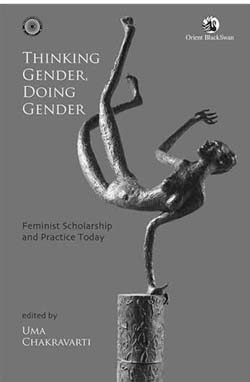This timely collection of essays is in equal measure a product of and a detailed comment on an important moment in the history of feminism in India, in which feminists reject the need for a unified subject of feminism, and turn towards a deeper interrogation of the activist/academic divide in making sense of feminism itself. It contains excellent essays that reveal the extent to which feminism in India has become alive to the intertwining of many different strands of power shaping of our patriarchies. The editor in her introduction remarks that the essays in the volume are about ‘doing’ gender rather than just ‘thinking’ it, but many of these essays show that feminism in India has often complicated that divide—it is not always just thinking, they seem to say. Rather, it was often the effort to develop a praxis in the fullest sense.
The collection is divided into three sections—on feminist pedagogies, on feminist interventions in history, and feminist understandings of, and interventions in, culture. Uma Chakravarti in her editorial introduction points out that these are themes articulated by a later generation of feminists in India, but it appears to me that what is really new is not the set of themes, but the manner in which they have been raised and discussed. Older themes have been reexamined in the light of the emergent awareness of the complexity of Indian patriarchies, which demands that we take into consideration the confluence of contingent and emergent axes of power that produce immediate forms of masculinism and misogyny. Also, in the best of these essays, feminist teachers, researchers, theatre people, and activists reflect on their own praxis in the light of contemporary challenges. Not all the essays included are in this refreshing mode even though each of them offers thoughtful analysis—some are in the more familiar mode of feminist critique of patriarchal institutions or practice and does not always draw upon activist experience or self-reflexive reflection on fieldwork.

